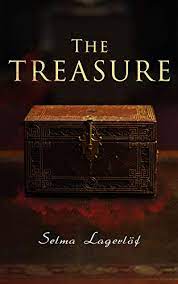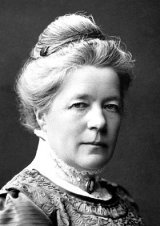The Treasure Page #10
The Treasure is a 1904 novel by the Swedish writer Selma Lagerlof. Its original Swedish title is Herr Arnes penningar, which means "Mr. Arne's money". It has also been published in English as Herr Arne's Hoard. Set in Bohuslän in the 16th century, it tells the story of a group of Scottish mercenaries who escape from prison; they go on to murder a family to steal a treasure chest, after which one of them falls in love with the family's sole survivor.
"Now you must tell us where you have found it, mistress," said another of the fishermen. "I found it rolling before me in the street," said Elsalill. "One of the murderers has surely dropped it there." "It may be as you say," said Torarin, "but what can we do in this matter? We cannot find the murderers by this alone, that you know they have walked in one of our streets." The fishermen were agreed that Torarin had spoken wisely. They settled themselves again about the fire. "Come home with me, Elsalill," said Torarin. "This is not an hour for a young maid to run about the streets of the town." As Torarin said this, Elsalill looked about for her companions. But Sir Reginald and Sir Philip had stolen away without her noticing their departure. CHAPTER VI IN THE TOWN CELLARS One morning the hostess of the Town Cellars at Marstrand threw open her doors to sweep the steps and the lobby, and then she caught sight of a young maid sitting on one of the steps and waiting. She was dressed in a long gray garment which was fastened with a belt at the waist. Her hair was fair, and it was neither bound nor braided, but hung down on either side of her face. As the door opened she went down the steps into the lobby, but it seemed to the hostess that she moved as though walking in her sleep. And all the time she kept her eyelids lowered and her arms pressed close to her side. The nearer she came, the more astonished was the hostess at the fragile slenderness of her form. Her face was fair, but it was delicate and transparent, as though it had been made of brittle glass. When she came down to the hostess she asked whether there was any work she could do, and offered her services. Then the hostess thought of all the wild companions whose habit it was to sit drinking ale and wine in her tavern, and she could not help smiling. "No, there is no place here for a little maid like you," she said. The maiden did not raise her eyes nor make the slightest movement, but she asked again to be taken into service. She desired neither board nor wages, she said, only to have a task to perform. "No," said the hostess, "if my own daughter were as you are, I should refuse her this. I wish you a better lot than to be servant here." The young maid went quietly up the steps, and the hostess stood watching her. She looked so small and helpless that the woman took pity on her. She called her back and said to her: "Maybe you run greater risks if you wander alone about the streets and alleys than if you come to me. You may stay with me today and wash the cups and dishes, and then I shall see what you are fit for." The hostess took her to a little closet she had contrived beyond the hall of the tavern. It was no bigger than a cupboard and had neither window nor loophole, but was only lighted by a hatch in the wall of the public room. "Stand here today," said the hostess to the maid, "and wash me all the cups and dishes I pass you through this hatch, then I shall see whether I can keep you in my service." The maiden went into the closet, and she moved so silently that the hostess thought it was like a dead woman slipping into her grave. She stood the whole day and spoke to none, nor ever leaned her head through the hatch to look at the folk who came and went in the tavern. And she did not touch the food that was set before her. Nobody heard her make a clatter as she washed, but whenever the hostess held out her hand to the hatch, she passed out clean cups and dishes without a speck on them. But when the hostess took them to set them out on the table, they were so cold that she thought they would sear the skin off her fingers. And she shuddered and said: "It is as though I took them from the cold hands of Death himself." II One day there had been no fish to clean on the quays, so that Elsalill had stayed at home. She sat at the spinning-wheel and was alone in the cottage. A good fire was burning on the hearth, and it was light enough in the room. In the midst of her work she felt a light breath, as though a cold breeze had swept over her forehead. She looked up and saw her dead foster sister standing beside her. Elsalill laid her hand on the wheel to stop it, and sat still, looking at her foster sister. At first she was afraid, but she thought to herself: "It is unworthy of me to be afraid of my foster sister. Whether she be dead or alive, I am still glad to see her." "Dear sister," she said to the dead girl, "is there aught you would have me do?" The other said to her in a voice that had neither strength nor tone: "My sister Elsalill, I am in service at the tavern, and the hostess has made me stand and wash cups and dishes all day. Now the evening is come and I am so tired that I can hold out no longer. I have come hither to ask if you will not give me your help." When Elsalill heard this it was as though a veil was drawn over her mind. She could no longer think nor wonder nor feel any fear. She only knew joy at seeing her foster sister again, and she answered: "Yes, dear sister, I will come straight and help you." Then the dead girl went to the door, and Elsalill followed her. But as they stood on the threshold her foster sister paused and said to Elsalill: "You must put on your cloak. There is a strong wind outside." And as she said this her voice sounded clearer and less muffled than before. Elsalill then took her cloak from the wall and wrapped it around her. She thought to herself: "My foster sister loves me still. She wishes me no evil. I am only happy that I may go with her wherever she may take me." And then she followed the dead girl through many streets, all the way from Torarin's cabin, which stood on a rocky slope, down to the level streets about the harbour and the market place. The dead girl always walked two paces in front of Elsalill. A heavy gale was blowing that evening, howling through the streets, and Elsalill noticed that when a violent gust would have flung her against the wall, the dead girl placed herself between her and the wind and screened her as well as she could with her slender body. When at last they came to the town hall the dead girl went down the cellar steps and beckoned Elsalill to follow her. But as they were going down the wind blew out the light in the lantern that hung in the lobby and they were in darkness. Then Elsalill did not know where to turn her steps and the dead girl had to put her hand on hers to lead her. But the dead girl's hand was so cold that Elsalill started and began to quake with fear. Then the dead girl drew her hand away and wound it in a corner of Elsalill's cloak before she led her on again. But Elsalill felt the icy chill through fur and lining. Now the dead girl led Elsalill through a long corridor and opened a door for her. They came into a little dark closet where a feeble light fell through a hatch in the wall. Elsalill saw that they were in a room where the scullery wench stood and scoured cups and dishes for the hostess to set out on the tables for her customers. Elsalill could just see that a pail of water stood upon a stool, and in the hatch were many cups and goblets that wanted rinsing.
Translation
Translate and read this book in other languages:
Select another language:
- - Select -
- 简体中文 (Chinese - Simplified)
- 繁體中文 (Chinese - Traditional)
- Español (Spanish)
- Esperanto (Esperanto)
- 日本語 (Japanese)
- Português (Portuguese)
- Deutsch (German)
- العربية (Arabic)
- Français (French)
- Русский (Russian)
- ಕನ್ನಡ (Kannada)
- 한국어 (Korean)
- עברית (Hebrew)
- Gaeilge (Irish)
- Українська (Ukrainian)
- اردو (Urdu)
- Magyar (Hungarian)
- मानक हिन्दी (Hindi)
- Indonesia (Indonesian)
- Italiano (Italian)
- தமிழ் (Tamil)
- Türkçe (Turkish)
- తెలుగు (Telugu)
- ภาษาไทย (Thai)
- Tiếng Việt (Vietnamese)
- Čeština (Czech)
- Polski (Polish)
- Bahasa Indonesia (Indonesian)
- Românește (Romanian)
- Nederlands (Dutch)
- Ελληνικά (Greek)
- Latinum (Latin)
- Svenska (Swedish)
- Dansk (Danish)
- Suomi (Finnish)
- فارسی (Persian)
- ייִדיש (Yiddish)
- հայերեն (Armenian)
- Norsk (Norwegian)
- English (English)
Citation
Use the citation below to add this book to your bibliography:
Style:MLAChicagoAPA
"The Treasure Books." Literature.com. STANDS4 LLC, 2025. Web. 11 Mar. 2025. <https://www.literature.com/book/the_treasure_6>.








Discuss this The Treasure book with the community:
Report Comment
We're doing our best to make sure our content is useful, accurate and safe.
If by any chance you spot an inappropriate comment while navigating through our website please use this form to let us know, and we'll take care of it shortly.
Attachment
You need to be logged in to favorite.
Log In